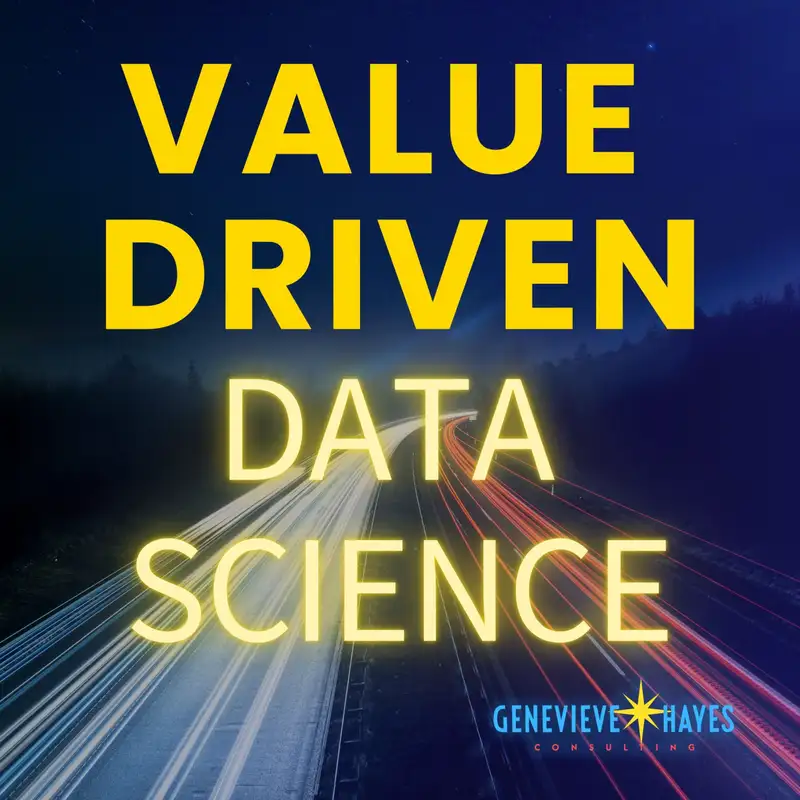Episode 60: 5 Executive Priorities That Transform Data Science Results into Business Value
Download MP3[00:00:00] Dr Genevieve Hayes: Hello and welcome to Value Driven Data Science, the podcast that helps data scientists transform their technical expertise into tangible business value, career autonomy, and financial reward. I'm Dr. Genevieve Hayes, and today I'm joined by Gregory Lewandowski, chief AI strategist and founder of GLEW. A consultancy focusing on the business side of AI ROI.
[00:00:26] In this episode, we'll be discussing the five executive care abouts. Five executive priorities that you can leverage to gain faster buy in and support for your data science work. So get ready to boost your impact, earn what you're worth, and rewrite your career algorithm. Gregory, welcome to the show.
[00:00:47] Gregory Lewandowski: Thank you, Genevieve.
[00:00:49] Dr Genevieve Hayes: As a data scientist, you're constantly told that if you want to succeed in your career, you need to create business value.
[00:00:56] In fact, this podcast itself was born out of my desire to understand just what creating business value means to different organizations and data scientists. Yet in speaking to the many very impressive guests I've had the privilege of interviewing while hosting this show. One thing that's come up again and again is the observation that data scientists frequently struggle to create value.
[00:01:22] Now, the problem clearly isn't a lack of intelligence. And it's not that data scientists haven't heard the advice about value creation. They've probably heard it a thousand times. So, in your opinion, Gregory, why do you think data scientists find this advice so hard to follow?
[00:01:42] Gregory Lewandowski: Wow. So that is an excellent question. And I think that the primary reason that it's so difficult to follow is there's just too much expected of your unicorn data scientists. They are expected to not only be up to date on the latest technology, they're expected to know all of the Surrounding technologies.
[00:02:09] They are also expected to know the business. They're expected to read my mind. They're expected to predict the future. They're expected to be right all the time. And the expectations are unreal. So for your unicorn data scientists for your exceptional data scientists out there. Not only do you have to know the technical side of things, but you also have to be deep, deep, deep into the business side of things.
[00:02:39] And it's an unreal expectation for most people. Not from an intelligence perspective, but from an exposure perspective, if you've spent your life studying mathematics and systems and infrastructure and coding, how much do you know about change management and how much should you be expected to know?
[00:03:01] So there's kind of this dichotomy of things that should be known to be excellent at it. A lack of time. Does that make sense?
[00:03:10] Dr Genevieve Hayes: Yeah, totally makes sense. I mean, my observation is that the recruitment process for many data science jobs is setting up the people who get them for failure, because if you look at your typical ad for a data scientist, it's a laundry list of technical skills, many of which the organization probably doesn't even need.
[00:03:33] It's just well, we might need it in the future. So the person who gets it is going to be someone who can tick all those technical boxes. And then. That gives the data scientists the impression that those technical skills are what are most valued. But then they're in this job and they get told, well, actually, we want you to have those, but we also want you to have all these additional other skills that we didn't mention when you got the job.
[00:04:01] And we can't train you in them because we don't have time. We actually want you to be up to speed. And it's not really fair on the poor data scientists in many ways.
[00:04:11] Gregory Lewandowski: Agreed. Agreed. Completely agreed. And in fact, you're touching on one of my hot points here. I've been exploring and looking at chief data officer roles for years to see how they're changing. And for the most part, they're not, they're still expecting a chief data officer, which is a leadership role that has a seat at the table with the C suite to be able to debug Python and to be an expert in SQL.
[00:04:38] And I think there's simply a mismatch between, again, expectations and reality. And you're right, they're looking for aspirational types of individuals or aspirational types of skills. Without quite knowing exactly what they need. And it simply becomes too much.
[00:04:58] It is an ongoing effort to continue to learn and hone the technologies that you love, the things that make you curious and trying to bring that together with all of these, I don't even want to call them soft skills, but experiential skills. Business skills, trying to bring them together.
[00:05:17] It works when done right, but it's rare.
[00:05:20] Dr Genevieve Hayes: From your experience, what are the career implications for the data scientists who do say, I'm just going to focus on the technical stuff and forget about all these business skills?
[00:05:30] Gregory Lewandowski: You might not like this answer, unfortunately. But for many years I have been suggesting that those are the skills that are going to be commoditized and that the machine will do. And We are seeing that to some extent nowadays, whether it is through ChatGPT or Cloud Anthropic or, a host of other applications that are very specifically designed to write code based upon a thought and an idea.
[00:05:59] I myself am writing code through prompts and is it enterprise ready code? No. But can I hire somebody to finish it? Yes. So that is unfortunately where I think that these hard skills end up without focusing on the soft skills or the experientials and business skills as well.
[00:06:20] Dr Genevieve Hayes: I agree with you entirely. I reckon the day that the first AutoML software came out was the first step towards the death of the purely technical data scientist. Because, if you can get AutoML to fit all the models, then it's only a matter of time before you can get your AI Chachapiti Claude to start doing it for you.
[00:06:43] Gregory Lewandowski: Yes. Agreed. Agreed. And it's going to continue to go further back into the process as well, right back into data quality, data governance et cetera. A process design that feeds the data quality. It's going to keep going to
[00:06:57] Dr Genevieve Hayes: Okay, so now we've just depressed the heck out of all of our listeners, so let's provide them with a solution to all of this.
[00:07:05] Gregory Lewandowski: I don't think we depressed them. I think we've given them opportunities, places to search for their next set of learning.
[00:07:12] Dr Genevieve Hayes: With regard to those places to search you've identified five key priorities that drive executive decision making. I'd say they're probably a good place to start. Can you share those with our listeners?
[00:07:25] Gregory Lewandowski: So let's go back in time a little bit. I spent many years working in the enterprise and I ran an analytics visualization and business intelligence organization for our channel organization. And one of the things that I found there. Was it didn't matter if I had a better tool, a better visualization, a faster process, none of that mattered.
[00:07:50] If I could not accomplish one of these five things. If I couldn't help my clients to make money, to save money, to make their clients happier, to make their employees happier or to reduce risk, I was wasting their time and I will add to that.
[00:08:08] Of those five, if I can help my clients make money or reduce risk, those are two areas that can find budget just about any time in a budget cycle because they are more important than the budget cycle. Typically, if you can raise revenue or if you can keep the executives or the company out of the papers in the wrong way those are incredibly valuable and they will break a budget cycle in order to do that.
[00:08:37] The other thing that I found, and this is going to be anathema to a number of individuals, especially kind of in the hard skills and hard sciences side of the world. Let's call it I. T. operations and finance. Typically, helping them save money is the least compelling of those 5 executive care abouts.
[00:08:56] Dr Genevieve Hayes: Okay, do you want to elaborate on why that's the case? Because I think I know the answer, but I'll let you share it.
[00:09:02] Gregory Lewandowski: So, what I have found is that there are a thousand ways to save money, a thousand ways to increase margin, to reduce costs, to improve productivity. And that could be changing the coffee that you use in the office to turning the lights off 15 minutes earlier, reducing the heat in the office.
[00:09:23] There's a thousand ways to save money, but there are far fewer ways to really raise. The revenue and increasing revenue, increasing top line is always more attractive than reducing bottom line, even though they tend to achieve the same things in the long run, it's always a more attractive option and again, reducing risk anytime you can reduce the embarrassment associated with an activity you will be far more successful than simply saying I saved you 3%.
[00:09:54] Dr Genevieve Hayes: Well, I mean, simplest way for an organization to save money is fire 100 percent of their employees.
[00:10:00] Gregory Lewandowski: Correct.
[00:10:01] Dr Genevieve Hayes: They're not going to make any money in the future, but they've completely cut their employee expense to zero.
[00:10:07] Gregory Lewandowski: Exactly. So
[00:10:08] Dr Genevieve Hayes: so I get where you're coming from with that. How do you know which of these priorities is most important for your organisation?
[00:10:16] Gregory Lewandowski: they don't always, but they tend to follow a pattern. When we see new technology introduction in this case, nowadays we're seeing AI out there quite a bit. So we often see things start with a cost savings because it is the low hanging fruit. It is the easiest to articulate. It is the first thing that people reach for.
[00:10:36] It is also, like I said, the least value derived from it, but it is the easiest to get to. Second, we will often see revenue generation as the second wave, because people start to realize that whatever the technology is that was driving that cost savings can then be flipped around to drive revenue instead.
[00:10:58] And third, we start to see things like a business model innovation, which often comes in the form of customer or employee satisfaction, as well as risk reduction to drive that next phase of it. So it depends on the company. It depends on where you are on the continuum. It depends on what your clients are like and what business you're in.
[00:11:20] So there's really not a single answer there, but we do tend to see some general patterns.
[00:11:26] Dr Genevieve Hayes: So given we have these five priorities now, and we've identified that problem that, you can't be a purely technical data scientist if you want to succeed in the age of AI. How can data scientists make use of this information to gain greater buy in and support for their work and increase their likelihood of success in their jobs?
[00:11:48] Gregory Lewandowski: Another hardball. Okay. So let's break this into three different areas. First one, I will say, follow the money. What I mean by that is understanding the company you work at. From end to end from when a lead comes in to your company gets paid and understanding every process in between one of the things in my observation is that people often stay within their silos within their functions within their domains and.
[00:12:22] That's great for some roles, but for a role that is so intertwined with all of the functions within a company, understanding it from end to end is absolutely critical. So that would be number one, follow the money and understand as many of the processes and the pain points as you can for each of the functions.
[00:12:44] And, focus on the primary functions obviously being, go to market, finance, operations, marketing, et cetera. That's going to be absolutely critical to driving your success and being able to see how things connect together. Number two I would say let's bundle together metrics and compensation.
[00:13:03] The reality is that. Data science teams and business teams are measured very, very differently. And I think that there's a case where we need to rally for them to be measured in much the same way, not because of their personal. Outputs, but because of what they achieve for the company.
[00:13:25] So their metrics need to align in better ways to ensure that executives are getting the blockages out of the way and can really understand what they can do to help their data science teams while at the same time, ensuring that the data science teams are focused, not just on the. Algorithm for the sake of curiosity, which I've observed many times, but focused on the outcome for the sake of the business.
[00:13:52] So by ensuring that metrics are aligned and intense compensation, there is a much higher likelihood of ensuring that they are. Able to achieve what they're trying to accomplish. And that goes back up to the the leadership and the data science team to rally for an equal measure associated with the compensation metrics on both sides.
[00:14:16] And then. Finally, I would say, remember who the audience is. There's a saying out there that you've heard many times. Nobody wants to know how the sausage is made. And that is absolutely true. You've got to ensure that when you are talking to some individuals, you don't need to be talking about coefficients or algorithms.
[00:14:37] You really need to be talking about how this matches their strategy. And in fact, I just put a post up, today on LinkedIn about the value of strategic silences ensure that there is a silence that people can understand or ask questions that everybody is at the same knowledge level not because you're at a high knowledge level, but make sure that they have the basic understanding of what is trying to be communicated.
[00:15:04] Dr Genevieve Hayes: With all this in mind, what is the single most important change our listeners could make tomorrow to accelerate their data science impact and results?
[00:15:13] Gregory Lewandowski: I think that the single most important change that people could make is to understand what motivates your stakeholders. If you can understand not only what is being said, but what is going unsaid. And to be able to almost anticipate their needs, because you understand them, you understand their business, you understand what motivates them, you understand what demotivates them, you understand their compensation models, if possible, you don't need to know what they get paid, but how they get paid.
[00:15:50] All of these things are critical to designing the path forward that you make for yourself.
[00:15:56] Dr Genevieve Hayes: And in many ways, this would come back to the five buy ins because probably what motivates your stakeholders is going to be one of those. Are they interested in making more money? Are they interested in saving money, making the clients or employees happier or reducing risk? I'd say if you could get it down to one of those five, you're probably in a very good position,
[00:16:17] Gregory Lewandowski: I agree. And if you can identify two or three, even better. So at the end of the day, which is a cliche, I try to use less and less, most people are motivated in some way by their own personal compensation. So truly understanding how your stakeholders and how your clients are getting compensated.
[00:16:39] Is absolutely critical, but tie that into the five executive care about because it's not just what they're getting paid. It's also how they're impacting the organization.
[00:16:50] Dr Genevieve Hayes: which will ultimately lead to them getting promoted and making more money.
[00:16:54] Gregory Lewandowski: Ultimately. Yes.
[00:16:55] Dr Genevieve Hayes: So for listeners who want to get in contact with you, Gregory, what can they do?
[00:17:00] Gregory Lewandowski: Well, first off, they can follow me on LinkedIn. Okay, my name is Gregory Lewandowski, that's L E W A N D O W S K I, and I'm based in Raleigh, North Carolina. My website is still a little bit in process, but you can try the website at GLEWservices. com, and that's G L E W. How clever of me to use part of my name in the name of my company.
[00:17:27] And obviously you can email me at Gregory at GLEW services. com as well.
[00:17:33] Dr Genevieve Hayes: And there you have it. Another value packed episode to help turn your data skills into serious clout, cash and career freedom. If you enjoyed this episode, why not make it a double? Next week, catch Gregory's Value Boost, a five minute episode where he shares one powerful tip for getting real results, real fast.
[00:17:55] Make sure you're subscribed so you don't miss it. Thanks for joining me today, Gregory.
[00:18:01] Gregory Lewandowski: Thank you so much, Genevieve. I appreciate it. It was a pleasure.
[00:18:05] Dr Genevieve Hayes: And for those in the audience, thanks for listening. I'm Dr Genevieve Hayes, and this has been value driven data science.
Creators and Guests


